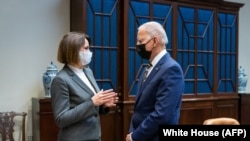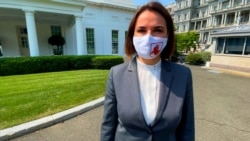It was a “very warm” meeting, complete with cookies and public support from President Joe Biden. But, ultimately, will Belarusian opposition leader Svyatlana Tsikhanouskaya’s surprise July 28 White House meeting with the U.S. leader make much difference for her pro-democracy campaign within Belarus?
Among Tsikhanouskaya’s own team, the brief talks appear to have lifted earlier doubts about the reliability of any long-term U.S. support for their efforts to have Belarus’ August 2020 presidential election results thrown out as fraudulent and a new vote to be held.
“I saw a person who is not indifferent to what is going on in Belarus. And I brought Mr. President our messages about how the fight in Belarus is not geopolitical. It’s our fight against violence, against lawlessness,” Tsikhanouskaya, believed by many to be the actual winner of the 2020 vote, commented in a post-meeting interview with Current Time America/Voice of America.
"We have the same values," she continued. "I’m leaving the White House with confidence that the United States will be with Belarusians – now and after the new elections.”
Alyaksandr Lukashenka, whose September 2020 presidential inauguration the United States and other Western countries have not recognized, has not responded to Tsikhanouskaya’s conversation with President Biden. The event passed unnoticed on Belarus’ predominantly state-controlled media outlets.
Citing a post-meeting tweet from President Biden, Tsikhanouskaya foreign policy advisor Franak Vyachorka named U.S. support “for the Belarusian people in their fight for freedom” as the “main result” of the encounter in the White House’s Roosevelt Room.
To end massive protests against Lukashenka's de facto rule following the 2020 presidential vote, the Belarusian government has detained or arrested tens of thousands of people, used brutal police violence against protesters, prosecuted or harassed independent news outlets (including RFE/RL, Current Time's parent organization), and, as part of what Lukashenka terms a campaign against “terror,” searched and detained civil society activists.
The nearly year-long crackdown has led to a large-scale exodus of opposition members, journalists, activists, analysts, and other Belarusians.
Belarusian political scientist Artyom Shraibman predicted that Tsikhanouskaya’s meeting with President Biden can serve as “a powerful political impulse for American bureaucracy” to respond more promptly in future to Tsikhanouskaya’s concerns about these developments.
National Security Council Senior Director for Europe Amanda Sloat and NSC Director for Eastern Europe and the Caucasus Chris Smith also joined the July 28 talks, according to Vyachorka. Tsikhanouskaya earlier this month met with U.S. Secretary of State Antony Blinken and National Security Advisor Jake Sullivan as well as other senior officials, congresspersons, and senators.
Any such intensified, high-level attention is “especially important, considering that our [political] crisis is clearly not a priority for Washington’s foreign policy,” Shraibman, who recently fled Belarus, said in a post on the Telegram messaging app.
During her roughly 15-minute-long meeting with Biden, Sloat, and Smith, Tsikhanouskaya reportedly discussed Belarus’ overall political situation, political prisoners, and the Belarusian government’s recent repressions against independent media and civil society members.
She again urged the need for sanctions against Belarus' oil-refining and potash industries “to close the loopholes for Lukashenka’s regime, for his accomplices,” Vyachorka* added.
Cooperation with the U.S. and the “importance of preserving Belarus’ sovereignty and independence” – an apparent reference to Russia, with which Lukashenka plans an alliance just short of a merger – were also covered.
A former English teacher and translator, Tsikhanouskaya conducted the meeting solo and in English. A government limousine with a Secret Service escort brought her to the White House, said Vyachorka, who claimed the White House observed all “rituals” customary for “a national leader’s visit.”
Still, one Belarusian political analyst wagers that the Biden meeting could backfire on Tsikhanouskaya within Belarus. Given the country’s growing sympathies for Russia, noted Shraibman, the brief visit with the U.S. leader is “more likely to alienate the electorate than add to it.”
“The one indisputable effect of these trips is the attention span [for Belarus] in world media,” he commented.
Google News search results on July 29, however, show relatively limited English-language coverage of Belarus, and that dominated by mainstream U.S. news outlets.
Tsikhanouskaya’s description of President Biden entering the Roosevelt Room bearing “a pile of cookies” for her prompted some mockery among Russian-language Twitter users. One joked that the U.S. “bought Ukraine for a package of cookies, but they figured they could get Belarus for cheaper.”
Still others on social media have compared the White House’s support for Tsikhanouskaya to its support for Venezuelan opposition leader Juan Guaido, whom the Biden administration recognizes as the elected president of Venezuela over Nicolas Maduro. After more than two and a half years of struggle, Guaido has not succeeded in removing the authoritarian Maduro from power.
Tsikhanouskaya, however, rejected the comparison.
“I’m not attempting to take power in Belarus. I simply want them to return to us, to Belarusians, the right to choose our own president,” she stressed, in reference to Lukashenka’s de facto government.
The 38-year-old homemaker-turned-politician stressed that she neither intends to run for office in any fresh presidential elections, nor “to build a political career.”
Nonetheless, since fleeing to Lithuania in August 2020 following violent crackdowns on Belarus’ post-election protests, she has succeeded in building access for Belarus' opposition within Western corridors of power.
For Vyachorka, that alone shows that her team’s mission has succeeded.
“For 27 years, Lukashenka froze the country, diplomacy didn’t develop, relations weren’t built,” he charged. “Now, Tsikhanouskaya is doing this.”
--*Editor's Note: Vyachorka is a former employee of USAGM, an independent U.S. agency which oversees congressional funding for Current Time’s parent, Radio Free Europe/Radio Liberty.









